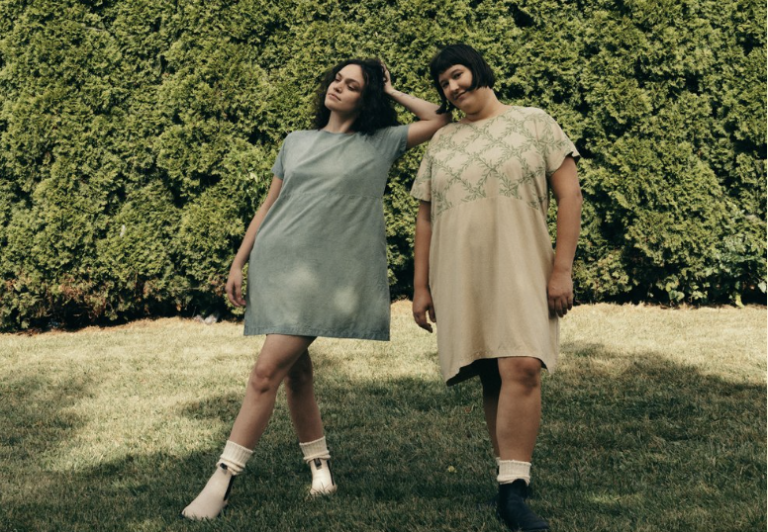
- Kim Kisner
- Business
- 01/28/2025
Detroit Hand-Crafted Apparel Brand Shares Insights on Approach and Ethos

Object Apparel is a sustainability-driven clothing brand based in Detroit, dedicated to crafting handmade, organic apparel with a focus on ethical practices and environmental stewardship. Founded by artist and architect Mollie Decker, the company began in a spare bedroom of a high-rise apartment in Lafayette Park and has since grown into a live-work space in North Corktown.
Object Apparel emphasizes the use of organic fabrics, natural plant-based dyes, and water-based screen-printing inks to create distinctive, high-quality pieces that offer a meaningful alternative to fast fashion. The brand’s mission goes beyond aesthetics, aiming to blend thoughtful design with sustainable practices that minimize environmental impact.

SBN Detroit spoke with Decker to explore the sustainability challenges faced by small, handcrafted-apparel companies, the strategies behind maintaining eco-conscious practices, and the creative solutions that make sustainability integral to Object Apparel’s philosophy.
Q: What inspired you to prioritize sustainability in your business, and how has that shaped Object Apparel?
A: Sustainability is something I strive to practice in all aspects of my life. For the business, it’s shaped less visible areas like sourcing and production methods while also fueling creativity. For example, I often use scrap fabric to make unique, one-of-a-kind pieces, blending sustainability with artistic expression.
Q: How do you approach sustainability in your materials, dyes, and production processes?
A: We use organic fabrics, natural plant-based dyes, and water-based screen-printing inks, which are softer and bond to the fabric over time. This method is more sustainable than traditional plastisol inks and ensures a higher-quality feel.
Committed to minimizing waste, our packaging is biodegradable, and we follow a made-to-order production model. Additionally, we aim to repurpose as many scraps as possible.
Q: What do you see as the biggest sustainability challenges for small, handcrafted apparel businesses?
A: Cost is a significant challenge. Ethical production is expensive, and many consumers compare small-batch prices to mass-produced items made overseas. Sustainable materials—natural dyes, organic fabrics, and even thread—are significantly more expensive than conventional alternatives. Balancing affordability while adhering to ethical practices requires constant attention to sourcing and wholesale opportunities. Staying true to our values while finding the right audience requires resilience and a strong voice.
Sourcing sustainably is a challenge as well. I primarily work with mills and wholesalers who can accommodate small orders. For fabrics, I rely on a mill in North Carolina and a hemp wholesaler in California. Balancing budget constraints with sustainability is tricky, but supporting businesses that share our values is important to me.
I think scaling would be a colossal challenge for small hand-crafted apparel businesses, and we’ve intentionally chosen not to do so. Everything is made in-house by me, and my partner, Mike, handles the screen printing. Everything we do is labor-intensive. Scaling would likely mean raising prices significantly or altering how we work, which doesn’t align with our ethos.
I don’t believe being as profitable as possible and selling the most possible is sustainable. There’s more clothing already in the world than anyone could ever need in our lifetimes, so really… is making anything sustainable? It’s something I think about a lot.
Q: Do you collaborate with local artists or makers, and how do those partnerships influence your work?
A: While all clothing production is done in-house, we collaborate with photographers and models to create visuals for our brand. We also partner with other makers and friends to host events like group shows and clothing swaps, which foster community and support shared sustainability goals.

Q: Are there emerging practices in sustainable fashion that excite you or align with your vision?
A: I’m an architect by trade and came into fashion as an artistic outlet, so I don’t follow fashion industry trends closely. However, I’m excited about the growing availability of hemp fabric since hemp is an incredible material that’s sustainable and versatile. Legalization has opened doors to better options at more reasonable prices.
Q: What approach works best in terms of educating customers about sustainability and its role in small brands?
A: I’ve learned that sustainability works best when modeled rather than preached. All you can do is model the behavior yourself as an individual and a brand and then you seem to attract like individuals as well as invite people in to learn more when they decide it’s right for them. I don’t focus on marketing Object Apparel as a “sustainable” brand – it started as a passion project and remains rooted in art and ethics.
Q: What advice would you give to someone entering the apparel industry who wants to be sustainable?
A: Define your ethics and stick to them. Sustainability means different things to different people, and the industry is rife with greenwashing. Establish what matters most to you and your customers, and work within those parameters, just as we do in life.
Be sure to subscribe to our newsletter for regular updates on sustainable business practices in and around Detroit.
Kim Kisner
- All
- Business
- Community
- Education
- Events

Unique Monique Scented Candles, a Detroit-based business founded by Monique Bounds., aims to produce candles and household products with clean ingredients and local supply chains. What began as a personal hobby during college has evolved into a full-time venture producing coconut oil and soy-based candles made with essential oils and locally sourced materials. SBN Detroit interviewed Bounds about launching a sustainable product line, sourcing challenges in Michigan, and...

Eastern Market Partnership, in collaboration with the City of Detroit’s Office of Sustainability Urban Agriculture Division, has announced $240,000 in grant funding to support Detroit-based farmers and farmer collectives. The grants will advance food access, climate education, sustainable land use, and economic opportunity, with priority given to Black- and Indigenous-led farms, youth-led initiatives, and projects rooted in historically disinvested neighborhoods. The recipients – ranging from cooperatives and community...

Citizen Robotics is a Detroit-based nonprofit that advances the use of robotics and digital manufacturing in residential construction, focusing on improving productivity, sustainability, and long-term affordability. Best known for its early work in 3D-printed housing, it explores how alternative construction methods and new financial models can reduce material waste, lower lifetime operating costs, and enhance the resilience of homes. SBN Detroit interviewed Tom Woodman, founder and president of...







